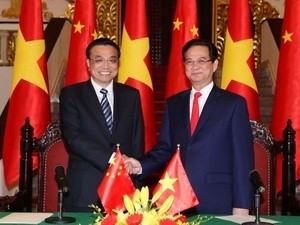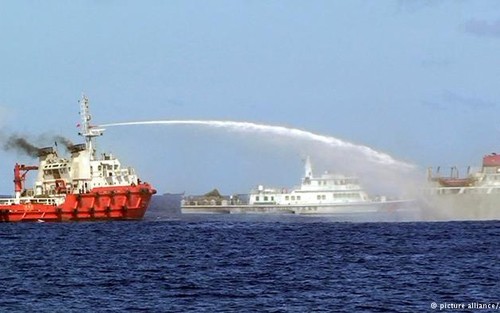(VOVworld) – China’s illegal placement of oil rig Haiyang 981 in Vietnam’s exclusive economic zone (EEZ) and continental shelf prior to the 24th ASEAN Summit and Asia Security Dialogue in Shangri-La was a surprise move, breaking its pledge to improve relations with ASEAN toward the signing of a Code of Conduct in the East Sea (COC) and damaging the region’s faith in “China’s peaceful rise”.

Vietnamese Prime Minister Nguyen Tan Dung shook hands with Chinese Prime Minister Li Keqiang during his visit to Vietnam from October 13-15, 2013. |
A few days after China’s deployment of the oil rig, the ASEAN Foreign Ministers issued a joint statement expressing their concern over China’s dangerous unilaterally actions.
The joint statement showed ASEAN united in its stance. Although ASEAN nations have divergent interests and China has an overwhelming influence in the region, the statement removed any doubt about ASEAN unity on this complicated issue.
 |
A Chinese vessel fires water cannons at Vietnamese vessels (photo: AP)
|
China’s inconsistency between words and actions
At the ASEAN summit and ASEAN meetings with partners in late 2013, a Chinese leader made the impressive statement that China and ASEAN share a common fate, luck, and sorrow and the two sides should build trust and develop good neighborliness and solidarity. At the 10th anniversary of the ASEAN-China strategic partnership, Chinese Prime Minister Li Keqiang proposed turning the “golden decade” of ASEAN-China relations into a “diamond decade” and signing an ASEAN-China Good Neighborliness, Friendship, and Cooperation Treaty. China also proposed building a 21st century maritime silk road for trade development, spreading China’s culture but not its territory.
Last May, Chinese Foreign Minister Wang Yi’s visit to ASEAN, his first overseas visit as Foreign Minister, raised hopes that China would give top priority to diplomatic relations with its neighbors and treat ASEAN as an important strategic partner.
ASEAN has taken every opportunity to improve relations with China and has trusted Beijing’s proposals for the region’s future. ASEAN praised the Chinese 3-Goods Treaty initiative and agreed to build an ASEAN-China Maritime Partnership. ASEAN has suggested other trust building measures for the second decade of the ASEAN-China strategic partnership. ASEAN has effectively implemented the Declaration on the Conduct of Parties in the East Sea (DOC) and has been actively involved in building the Code of Conduct of Parties in the East Sea. ASEAN anticipated that the “Chinese dream” would become the “Southeast Asian dream” when China would change its approach to maritime disputes with regional neighbors.
ASEAN and the world were shocked by the way China betrayed its friendship with ASEAN by illegally placing an oil rig in Vietnam’s EEZ, firing water cannons at, ramming Vietnamese law enforcement vessels, and sinking a Vietnamese fishing boat. Chinese media has even clamored “to teach Vietnam a lesson if Vietnam resists”.
China’s actions have gravely threatened regional peace and stability, violated international law, and broken Beijing’s commitments to the DOC. China has failed in its commitments to ASEAN and its pledge to build a peaceful, stable, and prosperous region.
Lonely in its “peaceful rise” dream
With its provocative acts toward Vietnam and its ignoring of Philippine requests and the international court’s ruling on the Scarborough Shoal dispute, China has failed to assure the world and its neighbors that it is rising peacefully. The world is leery of China’s growing power when it disregards international law and strives to dominate the region. Is eroding its prestige through actions that contradict its leaders’ commitments really in China’s long-term interest?
A peaceful, stable environment is essential for development. Now that the peaceful environment and the trust of its neighbors have been disrupted, China will stand alone in its quest to become a superpower.